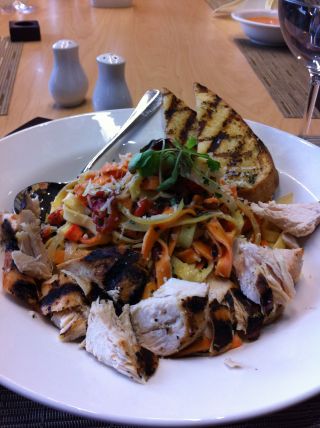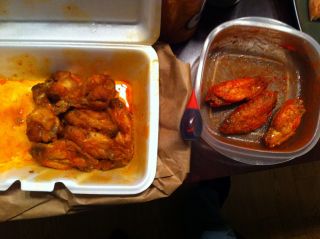Self-Control
New Year's Resolutions and How to Boost Your Willpower
Don't have any willpower? Here is how resolutions can help.
Posted January 3, 2013
Welcome to 2013. It's that time of year when people make their New Year's Resolutions.

Dr. Jim Davies and Cheetos
I know several people who don't bother to make them because they have a history of failing to keep them. This is a shame, because if you never test your willpower, it will never get any better.
I'm going to talk about how you can use New Year's resolutions to make your will stronger, but first, I'll give my own personal story regarding resolutions.
In 1988 my friend Lou and I decided to not drink soda pop for the entire year. Since then, we've made similar resolutions. So we've been doing this for a long time.
2012: The Year with No Orange Food
In 2012 I strove to not eat a single bite of orange food.
It's strange that I need to explain what this means, but people are often confused about it. What it means is that I was not allowed to eat anything that (under natural white light) is colored orange. (I was allowed to drink orange things.) One of the interesting things about this experience was that it made me look very carefully at the color of my food. We tend to get ideas into our heads about the colors of things, and then ignore the actual color. For example, I noticed that sometimes the interiors of plums and peaches were orange and sometimes they were red or yellow. Orange juice is usually yellow.
I only slipped up a few times: a few times I bit into something that had carrot in it but I didn't realize it, and other times I just didn't notice that what I was eating was orange. As usual, my screw ups were never based on giving in to temptation. If I was aware of what I was doing, I never ate orange food.
That is not to say it was easy. Once I ordered pasta, and when I got it I was dismayed to find that one third of the noodles were orange. See the image below.

Hard to eat pasta, with one third of the noodles colored orange.
So I had to pick out all of the orange noodles, which was slightly embarassing because I was receiving an award, and the lunch was a celebration.
Hot wings are sometimes orange and sometimes red. You just have to look at the wings and see. For borderline cases I would try to get a consensus from the people around me.
Once we got wings (from Pizza Shark, which has some of the best in Ottawa) and I was dismayed to find that they were orange. I really wanted them, so I put them in a container with some red food coloring and shook it about until they were red. Then I ate them.
Before you cry foul and say that it's cheating, please note that I was not breaking the resolution because I was actually not eating orange food. Is it a workaround? Yes, of course. Note that this would not work with any orange food—you can't food color a carrot because the interior of the carrot would still be orange. I could do this with hot wings only because the surface of the wings are the only part of the food that's orange.
I have documented this in a photo as well.

On the left are the original orange wings. On the right are the wings after the application of food coloring.
It is also worth noting that many orange foods are not naturally orange. Cheddar cheese is naturally white, and it's only colored orange. So if I can't eat orange cheddar cheese, it makes sense that I can eat red chicken wings.
Here are some of the orange foods I avoided: Orange cheese, squash, sweet potatoes, pumpkin, carrots, orange tomatoes, some plums, orange pasta, orange snacks (Cheetoes, Doritos, Cheez-its, etc.), orange peppers, some M&Ms, mangoes, many curries, apricots, turmeric, tangerines, cantelope, yams, some peaches, salmon (sometimes), orange sherbet, and, of course, oranges.
Coming up on the end of the year, I was able to start taking my multivitimins again (they were orange; see photo). I also was excited to eat the orange food I missed the most-- Cheetos. We went to a New Year's Eve party and I brought a big bag of Cheetos to eat after midnight. The photo at the top shows me in the first few moments of 2013. It was delicious.
2013: Saying "Don't Mind If I Do" before eating a cookie
For 2013, I've decided to say "don't mind if I do" before I eat a cookie.
How I Choose Resolutions
Most people choose resolutions that are vague. For example, one might want to exercise more, or to watch less TV. What I don't like about these resolutions is that it's hard to tell, at the end of the year, if you have succeeded, and impossible, day-to-day, to know if you're doing well. It's not well-enough defined. Compare these resolutions to, for example, exercising once per week, or watching no more than two hours of TV in a day. With these, you can know in a given day whether you've made a mistake. I know I'm only going to be doing the resolution for one year, so it need not be something I can keep up for a lifetime. It can be hard, but not too hard (green or brown food would have been impossible; blue food perhaps too easy).
Why do I do these resolutions? Mainly because they are good for conversations. They make me more interesting at parties. CBC Radio called me yesterday—they want to interview me about my resolutions at around 8:10am EST on "Ottawa Morning" January 7, 2013. You can listen online if you like at http://www.cbc.ca/ottawamorning/
Here are some other resolutions: 2011: Eat a blueberry every day, 2005: Eat no fruit. You can see a list of all the resolutions that I can remember on my FAQ.
New Year's Resolutions and Willpower
Recently I read Kelly McGonigal's excellent book, The Willpower Instinct. I recommend it for anyone who has any trouble with willpower. If you can only get yourself to read it...
Willpower is extremely important. People with more willpower are better able to manage stress, deal with conflict, overcome adversity, happier, healthier, relationships are more satisfying and last longer, make more money, are more successful in their careers, and live longer. It predicts leadership better than charisma, and predicts a good marriage better than empathy.
Most people assume that will is an unchanging trait. But it can change. It's actually like a muscle, in two important ways.
First, if you exercise it, it weakens. If you force yourself to do something difficult, like have a tough phone call, you will be more likely afterward to give in to a tempation, such as eating more dessert. As such, people tend to have more willpower in the morning, and it depletes, like a resource, over the course of the day.
The second way that it is like a muscle is that over time, using it and testing it makes it stronger. Even doing something as simple as making yourself brush your teeth with your non-dominant hand can increase your willpower over time.
I was delighted to see that the resolutions I'd been doing for the past 24 years are exactly the kinds of things one should be doing to build willpower. McGonigal recommends exercises involving not doing something (such as not eating orange food; 2012) or doing something (such as eating a blueberry every day; 2011), and doing things that require self-monitoring (not swearing; 1989). Over the years I've done resolutions that reflect these rules.
Rule-based resolutions are better than vague ones. For example, rather than having a resolution such as "I will eat less meat," try "No meat before dinner." Doing more or less of something requires constant wondering if you can do it right now or not. Following a rule is much easier. It still requires will, but it also makes things into a habit--which is a great way to change your own behavior.
I encourage you to make some resolution. It could be to make yourself better, or it could be like mine and be arbitrary and funny. Just make it rule-based and try to stick with it even if you screw up.
But in any case, just trying to use your willpower will make it strong in the long run.
Happy New Year.




